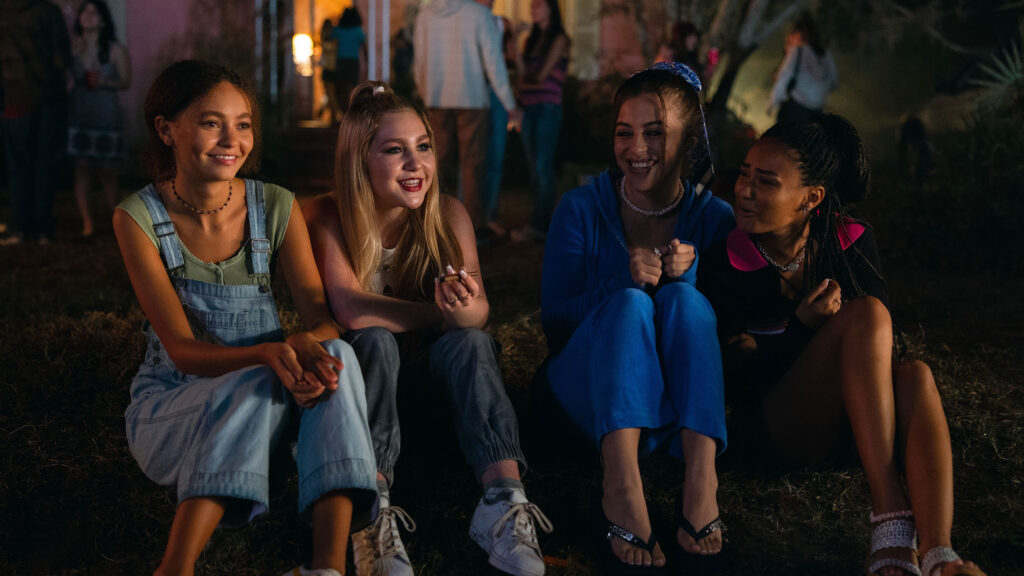Sundance Film Review: Linney and Parker Shine Amid Cloudy “Suncoast” Script
Sundance Film Festival 2024 entry Suncoast is Laura Chin’s debut project, and though she’s packed everything in it but the kitchen sink, some powerful messages still shine through.
There’s nothing quite like a cheeky, coming-of-age drama to get your juices flowing for greener cinematic pastures. I mean who hasn’t seen enough of them? But you might want to think twice about skipping Laura Chinn’s debut effort as writer and director in Suncoast. The film recently premiered in the 2024 Sundance Film Festival’s U.S. Dramatic Competition, snagging a special Jury Award for Breakthrough Performance. Chinn poured a lot into this film, which serves as a personal reflection of her own teen age angst set against the backdrop of her terminally ill brother and the wealth of emotional storm and struggle that caring for him brought.
It stars Nico Parker (The Last of Us) as Doris the daughter of single mom Kristine (played with steely devotion by Laura Linny). Kristine has spent the better part of the past few years relinquishing any hold on balanced, wholesome mothering to lavish as much care for her dying son as she has time left to give. Fallen in the wake of that zeal are Doris’ formative teen years and her right to blossom into a mature, young adult in a way that is even remotely healthy or normal. Doris has helped to care for her brother, Max (Cree Kawa), who has just recently been admitted into hospice care, and she’s keenly aware of the toll the situation has taken on her own relationship with Kristine in the process.
If that seems like a lot, it is. But Chinn sets this against an even more crowded backdrop that includes questions about the right-to-die, teen politics and extra-familial influences that leave way too many threads to pull to aptly explore the film’s true focus.
Unobtrusive and endearing, Doris watches as debate spills over into protests when real-life Michael Schavio fights to take his wife Terri off of life support (the controversial issue setting the film in 2005 Tampa, FL). Doris seems to be along for the ride as the overbearing Kristine barrels their way through hospital doors to transfer Max to the same facility. Barking at hospital staff and security along the way, she barely notices Doris is even there, and we quickly get the sense that she abandoned any need to nurture her young daughter for the sake of Max’s care years before.
Watching from the periphery is Paul. Giving as genuine a turn as the muddled script will allow, Woody Harrelson plays the right-to-die activist who sees something bright but stifled in Doris. They embark on a genuine friendship that helps her to steer the twists and turns teenage angst can bring along the way to maturity. Their on-screen friendship is aided greatly by a clear mutual admiration between the two actors, and it helps to overcome the challenges of Chinn’s rushed pace.
Adding further to the mix is a seemingly vacuous collection of cool kids that all but ignore Doris’ very existence at school, that is until she spies a conversation amongst the brood lamenting the loss of a planned party spot that evening. With Kristine camped out 24/7 at Max’s bedside, Doris sees her opportunity and takes it, volunteering her modest home to serve as host. The gang latches onto Doris like a king’s court to a jester, and we’re left bracing for the inevitable moment they lower the boom on the hapless, vulnerable girl, crushing her hopes of being seen and liked. Happily, however, Chin throws us a welcome curveball when the cool kids come through for Doris just when she needs them most. They support her when her brother’s condition comes to light, and they throw away a night on the town to get her to his bedside when the moment she and Kristine have feared finally arrives.
Despite the many threads at work in Suncoast, we see Doris taking the much needed opportunity to blossom into young adulthood. And watching Nico Parker flesh out the internal conflict that forces, in light of her familial obligations, is just a revelation. She brings us a character that evolves quite organically from innocence to resentment to self-discovery and maturity all within the scope of a tidy 109 minutes on screen.
Linney presents a resilient counterpart as a mother exigent in her dedication to a dying son. She blocks out everything that does not comport with her mission, even the existence of a daughter who needs her just as much right now, the revelation of this only becoming clear when she’s asked how many children she has, and her response is a deafening “one.” Linney’s Kristine is stunned into the reality of the neglect she’s inflicted upon her daughter, and her regret is unmistakable.
The evolution of these two characters is what makes Suncoast worth the ride, and what makes Chin’s debut effort a success.
Muddled, perhaps, Suncoast achieves a resolution you might never have thought it could. And in doing so, it reveals humanity from many angles. With a powerful message, masterful performances and well-meaning script, it salvages its possibilities from the dustbin of clutter that might have spelled its doom.
UPDATE: Suncoast has been released in Theaters and now streams on Hulu starting.




